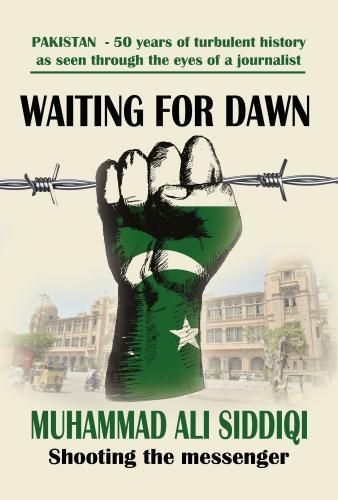Readings Newsletter
Become a Readings Member to make your shopping experience even easier.
Sign in or sign up for free!
You’re not far away from qualifying for FREE standard shipping within Australia
You’ve qualified for FREE standard shipping within Australia
The cart is loading…






This title is printed to order. This book may have been self-published. If so, we cannot guarantee the quality of the content. In the main most books will have gone through the editing process however some may not. We therefore suggest that you be aware of this before ordering this book. If in doubt check either the author or publisher’s details as we are unable to accept any returns unless they are faulty. Please contact us if you have any questions.
No one could be more qualified to write a memoir on Pakistan’s turbulent history than a grandstand viewer - and a journalist to boot. With more than half a century of experience in journalism - 49 years at Dawn, South Asia’s best paper - Muhammad Ali Siddiqi has been witness to events which have shaped today’s Pakistan and Karachi. He lived history as a citizen, and reported and commented as a newsman, in Pakistan and abroad. This book is thus his record for posterity of a mauled, brutalised nation’s history. The book is also a mirror to the life of a typical, self-made Karachian struggling to acquire education, while making two ends meet as a typist. This is a tribute as much to the author as to the city that threw open its doors to all those who chose to make it their home. Life for him was anything but a bed of roses, for he would sleep on the editing desk of the Times of Karachi to proceed in the morning to the new campus, located in what then was a wilderness of barren hills and brown land. That was 1960. In 1992, he was at the White House reporting on the Benazir-Clinton summit conference as Dawn’s Washington Correspondent.
Because his entry in the profession coincided with the first military takeover in 1958, he, like all Pakistani journalists, worked within the oppressive atmosphere of a military dictatorship, though, strange as it appears, author Siddiqi mentions Ayub Khan all along with respect. He makes no secret of his admiration for Z.A. Bhutto, who, he said, was murdered because of his reforms, especially the nationalsation of industry, and quotes Machiavelli, A man forgets his father (pater) but not his patrimony.
The book describes in detail the impact the military rule had on the press, the muzzling of the media, draconian laws, the journalists’ epic struggle for freedom, the historic 1970 strike, the flogging of journalists during Ziaul Haq’s tyranny, and the freedom which finally came after great sacrifices. Simultaneously, we get a glimpse of the technological revolution in printing, for Siddiqi began with hot metal and journeyed through photo-offset to finally enter the computer era when Dawn’s page are sent to Islamabad and Rawalpindi by a click.
$9.00 standard shipping within Australia
FREE standard shipping within Australia for orders over $100.00
Express & International shipping calculated at checkout
This title is printed to order. This book may have been self-published. If so, we cannot guarantee the quality of the content. In the main most books will have gone through the editing process however some may not. We therefore suggest that you be aware of this before ordering this book. If in doubt check either the author or publisher’s details as we are unable to accept any returns unless they are faulty. Please contact us if you have any questions.
No one could be more qualified to write a memoir on Pakistan’s turbulent history than a grandstand viewer - and a journalist to boot. With more than half a century of experience in journalism - 49 years at Dawn, South Asia’s best paper - Muhammad Ali Siddiqi has been witness to events which have shaped today’s Pakistan and Karachi. He lived history as a citizen, and reported and commented as a newsman, in Pakistan and abroad. This book is thus his record for posterity of a mauled, brutalised nation’s history. The book is also a mirror to the life of a typical, self-made Karachian struggling to acquire education, while making two ends meet as a typist. This is a tribute as much to the author as to the city that threw open its doors to all those who chose to make it their home. Life for him was anything but a bed of roses, for he would sleep on the editing desk of the Times of Karachi to proceed in the morning to the new campus, located in what then was a wilderness of barren hills and brown land. That was 1960. In 1992, he was at the White House reporting on the Benazir-Clinton summit conference as Dawn’s Washington Correspondent.
Because his entry in the profession coincided with the first military takeover in 1958, he, like all Pakistani journalists, worked within the oppressive atmosphere of a military dictatorship, though, strange as it appears, author Siddiqi mentions Ayub Khan all along with respect. He makes no secret of his admiration for Z.A. Bhutto, who, he said, was murdered because of his reforms, especially the nationalsation of industry, and quotes Machiavelli, A man forgets his father (pater) but not his patrimony.
The book describes in detail the impact the military rule had on the press, the muzzling of the media, draconian laws, the journalists’ epic struggle for freedom, the historic 1970 strike, the flogging of journalists during Ziaul Haq’s tyranny, and the freedom which finally came after great sacrifices. Simultaneously, we get a glimpse of the technological revolution in printing, for Siddiqi began with hot metal and journeyed through photo-offset to finally enter the computer era when Dawn’s page are sent to Islamabad and Rawalpindi by a click.